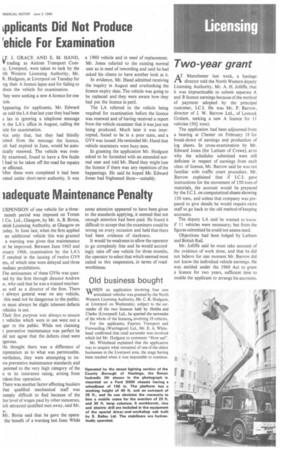Two-year grant
Page 43

If you've noticed an error in this article please click here to report it so we can fix it.
Ar Manchester last week, a haulage director told the North Western deputy Licensing Authority, Mr. A. H. Jolliffe, that it was impracticable to submit separate A and B licence earnings because of the method of payment adopted by the principal customer, I.C.I. He was Mr. P. Barrow, director of J. W. Barrow Ltd., of Lostock Gralarn, seeking a new A licence for 11 vehicles (50+ tons).
The application had been adjourned nom a hearing at Chester on February 18 for break-down of earnings and production of log sheets. In cross-examination by Mr. Edward Jones (for Latham of Crewe), as to why the schedules submitted were still deficient in respect of earnings from each class of licence, Mr. Barrow said he was not familiar with traffic court procedure, Mr.
Barrow explained that if gave instructions for the movement of 150 tons of materials, the account would be prepared by the I.C.I. on computerized sheets showing 150 tons, and unless that company was prepared to give details he would require extra staff to go back to the old method of keeping accounts.
The deputy LA said he wanted to know if 11 vehicles were necessary; but from the figures submitted he could not assess need.
Objections had been lodged by Latham and British Rail.
Mr. Jolliffe said he must take account of the evidence of work done, and that he did not believe for one moment Mr. Barrow did not know the individual vehicle earnings. He was entitled under the 1960 Act to grant a licence for two years, sufficient time to enable the applicant to arrange his accounts.








































































































































































